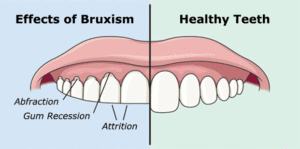Bruxism is excessive teeth grinding or jaw clenching It is an oral parafunctional activity which means it is unrelated to normal function such as eating or talking. Bruxism is a common problem and reports have suggested it may affect up to 20% of the population. Some of the commonly associated symptoms with bruxism include hypersensitive teeth, aching jaw muscles, headaches, tooth wear, damage to dental restorations (e.g. crowns and fillings) and damage to teeth. In many cases headaches can be one of the only short term side affect of Bruxism and therefore people may not be aware of the condition.
 There are two main types of bruxism: that which occurs during sleep (sleep bruxism) and that which occurs during wakefulness (awake bruxism). Dental damage may be similar in both types, but the symptoms of sleep bruxism tend to be worse on waking and improve during the course of the day, and the symptoms of awake bruxism may not be present at all on waking, and then worsen over the day. The causes of bruxism are not completely understood, but stress has been identified as one contributing factor.
There are two main types of bruxism: that which occurs during sleep (sleep bruxism) and that which occurs during wakefulness (awake bruxism). Dental damage may be similar in both types, but the symptoms of sleep bruxism tend to be worse on waking and improve during the course of the day, and the symptoms of awake bruxism may not be present at all on waking, and then worsen over the day. The causes of bruxism are not completely understood, but stress has been identified as one contributing factor.
If you are suffering with Bruxism we would generally recommend a mouth guard to protect your teeth, and minimise the effects of the grinding. But, while this will help the grinding issue short term, it might be advisable to seek help with your underlying stress or anxiety to fully resolve the matter, long term.
